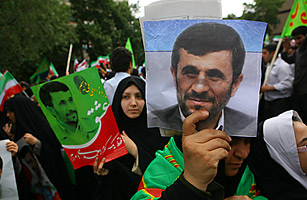
Supporters of President Mahmoud Ahmadinejad celebrate and hold his image during a rally at Valiasr square in Tehran
More than 48 hours after Iranian officials announced incumbent President Mahmoud Ahmadinejad's landslide 63.3% victory in the nation's presidential election, the situation in Tehran and elsewhere in the country remained tense Monday. Protesters outraged by what they believe was a rigged poll continued braving police charges and a government ban on public gatherings to denounce the outcome. Opposition candidate Mir-Hossein Mousavi, who is under what is effectively house arrest, demanded that the suspect result be scrapped and new elections be held. Iran's Supreme Leader Ayatullah Ali Khamenei has ordered an investigation into claims of electoral fraud.
World leaders have mostly reacted to Ahmadinejad's re-election with tight-lipped caution. Those who offered official commentary tended to question the fairness of the outcome without focusing on specific allegations. Typical was U.S. Secretary of State Hillary Rodham Clinton's remark that "we obviously hope that the outcome reflects the genuine will and desire of the Iranian people." In France — which has maintained a hard line toward Iran's nuclear-development program — advisers to President Nicolas Sarkozy said Ahmadinejad's win was "good news for no one" but reserved its hottest criticism for the police treatment of Iranian protesters.
Here's what the contested poll means for some of the key international players.